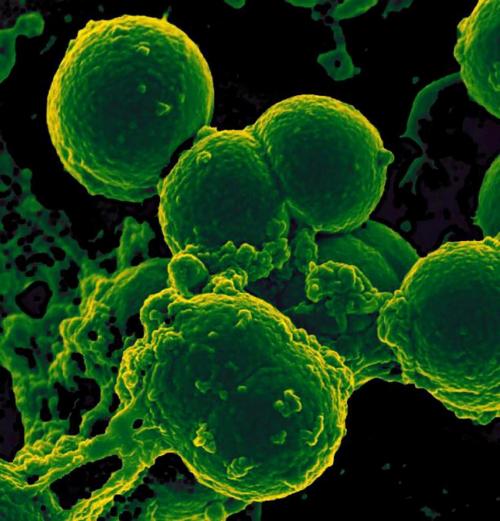Prolonged antibiotic treatment may alter preterm infants’ microbiome
Treating preterm infants with antibiotics for more than 20 months appears to promote the development of multidrug-resistant gut bacteria, suggests a study funded by the National Institutes of Health.

Scanning electron micrograph of neutrophil ingesting methicillin-resistant Staphylococcus aureus bacteria.
Researchers used high-speed DNA sequencing and advanced computational analysis to study stool samples from 32 infants born very preterm who received antibiotic treatment for 21 months (in the neonatal intensive care unit and after discharge), nine infants born very preterm who received antibiotics for less than a week, and 17 healthy term and late preterm infants who hadn’t received antibiotics. Infants who received prolonged antibiotic treatment had less diverse bacterial populations in their gut, compared to the other infants, and these bacteria contained more antibiotic resistance genes.
Moreover, the genomes of the high antibiotic use group contained genes for resistance to antibiotics typically not given to newborns, such as ciprofloxacin and chloramphenicol. One possible explanation is that these genes might originate in multidrug-resistant bacteria, so using a particular antibiotic may trigger resistance to other antibiotics, even if they were not used.
The researchers do not know the long-term effects of these genome changes, which they term “microbiota scars.” They note that previous studies linked antibiotic treatment during infancy with allergies, psoriasis, obesity, diabetes and inflammatory bowel disease later in life. Their findings raise the possibility that early-life antibiotic use may promote these effects by reducing the diversity of microbial communities in the gut, encouraging the growth of injurious bacterial species and perhaps also suppressing the growth of beneficial microbes.
The study received funding from NIH’s Eunice Kennedy Shriver National Institute of Child Health and Human Development (NICHD), National Institute of General Medical Sciences, National Institute of Allergy and Infectious Diseases, and National Institute of Diabetes and Digestive and Kidney Diseases.
Source: U.S. National Institutes of Health
- 322 reads
Human Rights
Fostering a More Humane World: The 28th Eurasian Economic Summi

Conscience, Hope, and Action: Keys to Global Peace and Sustainability

Ringing FOWPAL’s Peace Bell for the World:Nobel Peace Prize Laureates’ Visions and Actions

Protecting the World’s Cultural Diversity for a Sustainable Future

Puppet Show I International Friendship Day 2020

